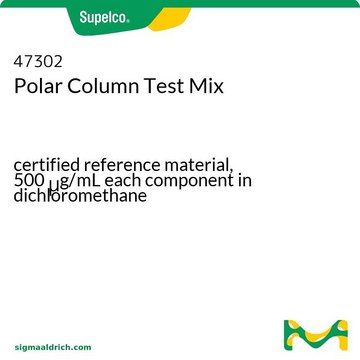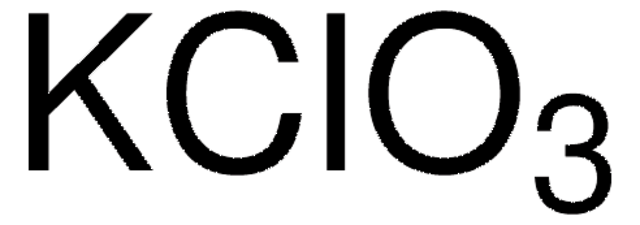244147
Sodium chlorate
ReagentPlus®, ≥99%
Iniciar sesiónpara Ver la Fijación de precios por contrato y de la organización
About This Item
Fórmula lineal:
NaClO3
Número de CAS:
Peso molecular:
106.44
EC Number:
MDL number:
UNSPSC Code:
12352302
PubChem Substance ID:
NACRES:
NA.55
assay:
≥99%
grade:
reagent
form:
crystals or chunks
Productos recomendados
grade
reagent
product line
ReagentPlus®
assay
≥99%
form
crystals or chunks
mp
248-261 °C (lit.)
SMILES string
[Na+].[O-]Cl(=O)=O
InChI
1S/ClHO3.Na/c2-1(3)4;/h(H,2,3,4);/q;+1/p-1
InChI key
YZHUMGUJCQRKBT-UHFFFAOYSA-M
¿Está buscando productos similares? Visita Guía de comparación de productos
Categorías relacionadas
General description
Sodium chlorate exhibits piezoelectric effect. On heating, it decomposes to give sodium chloride and sodium perchlorate. It can be synthesized in laboratory by reacting chlorine gas with a hot aqueous solution of sodium hydroxide or sodium carbonate.
Application
Sodium chlorate (NaClO3) has been used in the preparation of aromatic amino acid and σ32 peptide (from Drosophila melanogaster) samples for NMR analysis.
It may be used in the synthesis of chlorine dioxide and sodium perchlorate. It may also be employed as a sulfation inhibitor in the culture medium of HepG2 cells ((human hepatocellular liver carcinoma cells).
It may be used in the synthesis of chlorine dioxide and sodium perchlorate. It may also be employed as a sulfation inhibitor in the culture medium of HepG2 cells ((human hepatocellular liver carcinoma cells).
Biochem/physiol Actions
sulfation biosynthesis inhibitor
Legal Information
ReagentPlus is a registered trademark of Merck KGaA, Darmstadt, Germany
signalword
Danger
hcodes
Hazard Classifications
Acute Tox. 4 Oral - Aquatic Chronic 2 - Ox. Sol. 1
Storage Class
5.1A - Strongly oxidizing hazardous materials
wgk_germany
WGK 2
flash_point_f
Not applicable
flash_point_c
Not applicable
Elija entre una de las versiones más recientes:
¿Ya tiene este producto?
Encuentre la documentación para los productos que ha comprado recientemente en la Biblioteca de documentos.
Los clientes también vieron
Jung Ho Lee et al.
The journal of physical chemistry. B, 117(20), 6069-6081 (2013-04-09)
NMR is an extremely powerful, yet insensitive technique. Many available nuclear polarization methods that address sensitivity are not directly applicable to low-concentration biomolecules in liquids and are often too invasive. Photochemically induced dynamic nuclear polarization (photo-CIDNP) is no exception. It
Heidi Barth et al.
The Journal of biological chemistry, 278(42), 41003-41012 (2003-07-18)
The conservation of positively charged residues in the N terminus of the hepatitis C virus (HCV) envelope glycoprotein E2 suggests an interaction of the viral envelope with cell surface glycosaminoglycans. Using recombinant envelope glycoprotein E2 and virus-like particles as ligands
Eric Lee et al.
The Journal of emergency medicine, 44(2), 381-384 (2012-05-15)
Chlorate poisoning as a cause of methemoglobinemia is regarded in current literature to be resistant to treatment by methylene blue due to the oxidizing and denaturing properties of the chlorate anion, and often leads to severe renal and hematological complications
Juergen Burkhardt et al.
The New phytologist, 196(3), 774-787 (2012-09-19)
The recent visualization of stomatal nanoparticle uptake ended a 40-yr-old paradigm. Assuming clean, hydrophobic leaf surfaces, the paradigm considered stomatal liquid water transport to be impossible as a result of water surface tension. However, real leaves are not clean, and
Fei Wang et al.
Chemosphere, 89(8), 1009-1014 (2012-08-18)
Understanding the interaction of perfluorochemicals, persistent pollutants with known human health effects, with mineral compounds in surface water and groundwater environments is essential to determining their fate and transport. Kinetic experiments showed that adsorption equilibrium can be achieved within 48
Nuestro equipo de científicos tiene experiencia en todas las áreas de investigación: Ciencias de la vida, Ciencia de los materiales, Síntesis química, Cromatografía, Analítica y muchas otras.
Póngase en contacto con el Servicio técnico












